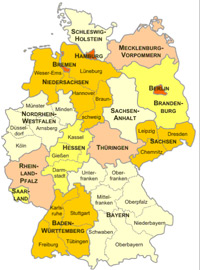Having a name like Meitzler immediately brands me as having a Germanic ancestry. It just happens that my great-grandfather was from Kriegsfeld, Rhinepfalz, Germany, and he married great-grandmother Elizabeth Damm, who was born nearby in Albishiem, Rhinefalz, Germany.
So I’m interested in German surnames. Meitzler most likely derives from “metz,” or butcher. As for Damm, a rather common name in Germany, I really don’t know, but the name certainly can cause grins and giggles when mentioned. I’ve even found one Damm that changed his name in a Monroe County, New York court “on account of the name being so similar to an American swear word.”
If you want to know more about German names, I recommend you check out  www.tr62.de/names/default.html . The site is operated by Thomas Rueffer in Germany. Thomas has an informative site which includes an eight-chapter guide to German names. The chapters are as follows:
www.tr62.de/names/default.html . The site is operated by Thomas Rueffer in Germany. Thomas has an informative site which includes an eight-chapter guide to German names. The chapters are as follows:
German Surnames – 1 – Introduction
German Surnames 2 – From one name to two names
German surnames 3 – Family names made up from first names (patronymic surnames)
Patronymic names from the Top 140 list; Celebrities; Other patronymic names
German surnames 4 – Family names made up from (distant) geographic names
Geographic names from the Top 140 list; Celebrities; Other geographic names
German surnames 5 – Family names made up from local place names
House location names from the Top 140 list; Celebrities
German surnames 6 – Occupational surnames
Occupational surnames from the Top 140 list; Celebrities; Other occupational surnames
German surnames 7 – Descriptive surnames
Descriptive surnames in the Top 140 surname list; Celebrities
German surnames 8 – Family names of different origins and foreign family names in Germany
Foreign family names in Germany
The entire guide as a PDF file.
Mr. Rueffer produces surname distribution maps, many of which are posted at his website. Click here to see his German Surname Map List, with links.
Thanks for this. I will be writing or calling you soon. Blessings Susi
Thanks for such great links and information! With Kuhn, Riffel, and Fricker in one of my lines, I love to find more details helping me understand the origins of the names. Thanks again!
Like you, Mietzner, but I feel for my family that are Fick & Ficken so when my google alert comes in with those names in small I deleat them, my poor Miesen – debt which seems to be alot lately – LOL. I will have to see what my others families names mean, Thanks!
Hey, Butcher!
How come the list of German names left out the religious cats such as Sebastian? My ggf was a Bavarian Sebastian. It is easier to find my mother’s churchy ancestors (My mother was a Pryor [Church Job] from Wales or maybe they just yelled a lot.) But the Germans maybe didn’t have many of the religious set.
Tom
Tom – keep in mind that the list is made up of some of the most popular names. However, I find that George F. Jones’ “German American Names,” writes the following: … during the Counter Reformation, the Roman Catholic Church required all parents to name their child for a saint, which was usually the saint on whose day it was born. Consequently, most of the old Germanic names fell into disuse, except for those of popular emperors such as Carl, Conrad, Friedrich, Heinrich, Leopold, Otto, Siegmund, and Wilhelm. Among the most popular masculine saints in Germany, as elsewhere in Europe, were Johann, Joseph, Matthaeus (or Matthias), Sebastian, and the archangels Raffael and Uriel.”
I am very interested in the Thomas Rueffer guide to Germa Surnames, but I am unable to access it at http://www.tr62.de/names/default.html . Is it available somewhere else ?
The Rueffer site seems to have disappeared. Bummer… There was some useful information there. If anyone out there knows of a new link, we’d be appreciative.
None of the sites seem to be working anymore ):
I’m very curious to know the origin of the German surname ‘Heuckendorff’. It’s a name that has been running in my family for a long time (We have traced it back to the 17th century Germany, but my family has been residing in Denmark since the 19th century) but nobody has been able to find any information on the meaning of the name. Perhaps someone could help me?
By the way, Mr. Meitzler, to the best of my knowledge the Damm name simply means ‘dam’ in English. The name is quite common in Danish too spelt either ‘Damm’ or ‘Dam’. However, in Danish a ‘dam’ literary translates to ‘a pond’ whereas a dam or the german ‘damm’ translates to the construction that impounds water.
I found Thomas Rueffer”s book at the following site
up.sur-la-toile.com/iM7N